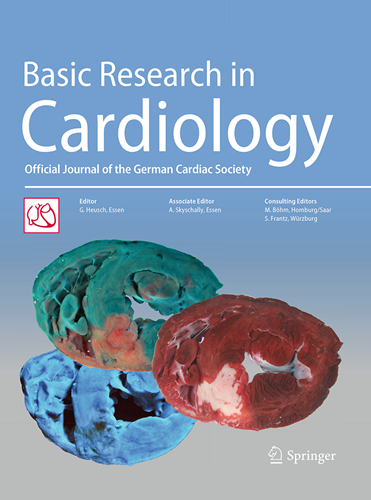A macrophage gene-regulatory network linked to clinical severity of coronary artery disease : The STARNET and NGS-PREDICT primary blood macrophage studies.
IF 8
1区 医学
Q1 CARDIAC & CARDIOVASCULAR SYSTEMS
引用次数: 0
Abstract
Coronary artery disease (CAD) is a major cause of global morbidity and mortality. Macrophages play a central role in orchestrating this disease process. In 2016, we initiated the STARNET primary blood macrophage study, followed by the multi-ethnic NGS-PREDICT primary blood macrophage study in 2018. We applied integrative systems genetics analysis to explore and validate the role of macrophage gene regulatory co-expression networks (GRNs) in clinically significant CAD. This study included 318 CAD cases and 134 CAD-free controls in STARNET, and 95 CAD cases and 35 CAD-free controls in NGS-PREDICT. Primary leukocytes were isolated from blood and differentiated into macrophages in vitro, followed by RNA extraction and deep sequencing (RNAseq). In STARNET, we analyzed differentially expressed genes, inferred macrophage GRNs, assessed the phenotypic associations and functions of these GRNs, and determined their key driver genes. Integrative analysis of STARNET expression quantitative traits (eQTLs) with genotype data from genome-wide association studies was performed to determine the content of CAD candidate genes in these GRNs, and their contributions to CAD heritability. Five independent RNAseq datasets were used to retrospectively validate CAD-associated macrophage GRNs, followed by prospective validation in the NGS-PREDICT study. Using the STARNET datasets, we identified 23 macrophage GRNs. Of these, GRNGREEN stood out as being causally associated with CAD severity (SYNTAX score) and comprised 729 genes and 90 key drivers, with the top key driver being NEIL1. GRNGREEN accounted for 3.73% of CAD heritability and contained 34 candidate genes previously identified by GWAS of CAD. Functional analysis of GRNGREEN revealed a large portion of genes involved in the biological process of SRP-dependent co-translational protein targeting to the membrane. GRNGREEN replicated retrospectively in five independent human arterial wall RNAseq datasets, and prospectively in the NGS-PREDICT study. To prevent clinically significant CAD, GRNGREEN and its top key driver NEIL1 may be suitable therapeutic targets to modify SRP-dependent co-translational targeting of proteins to the endoplasmic reticulum in macrophages.巨噬细胞基因调控网络与冠状动脉疾病的临床严重程度相关:STARNET和NGS-PREDICT原发性血巨噬细胞研究
冠状动脉疾病(CAD)是全球发病率和死亡率的主要原因。巨噬细胞在协调这种疾病的过程中起着核心作用。2016年,我们启动了STARNET原代血巨噬细胞研究,随后于2018年启动了多民族NGS-PREDICT原代血巨噬细胞研究。我们应用综合系统遗传学分析来探索和验证巨噬细胞基因调控共表达网络(grn)在临床显著CAD中的作用。本研究包括STARNET中318例CAD病例和134例无CAD对照,NGS-PREDICT中95例CAD病例和35例无CAD对照。从血中分离原代白细胞,体外分化为巨噬细胞,然后进行RNA提取和深度测序(RNAseq)。在STARNET中,我们分析了差异表达基因,推断了巨噬细胞grn,评估了这些grn的表型关联和功能,并确定了它们的关键驱动基因。将STARNET表达数量性状(eqtl)与全基因组关联研究的基因型数据进行整合分析,以确定这些grn中CAD候选基因的含量及其对CAD遗传力的贡献。五个独立的RNAseq数据集用于回顾性验证cad相关巨噬细胞grn,随后在NGS-PREDICT研究中进行前瞻性验证。使用STARNET数据集,我们确定了23个巨噬细胞grn。其中,GRNGREEN与CAD严重程度(SYNTAX评分)有因果关系,由729个基因和90个关键驱动因素组成,其中最重要的关键驱动因素是NEIL1。GRNGREEN占CAD遗传力的3.73%,包含34个CAD GWAS先前鉴定的候选基因。GRNGREEN的功能分析揭示了大部分参与srp依赖性共翻译蛋白靶向膜生物学过程的基因。GRNGREEN在5个独立的人动脉壁RNAseq数据集中进行了回顾性复制,并在NGS-PREDICT研究中进行了前瞻性复制。为了预防临床意义上的CAD, GRNGREEN及其主要驱动因子NEIL1可能是修饰巨噬细胞中srp依赖性蛋白协同翻译靶向内质网的合适治疗靶点。
本文章由计算机程序翻译,如有差异,请以英文原文为准。
求助全文
约1分钟内获得全文
求助全文
来源期刊

Basic Research in Cardiology
医学-心血管系统
CiteScore
16.30
自引率
5.30%
发文量
54
审稿时长
6-12 weeks
期刊介绍:
Basic Research in Cardiology is an international journal for cardiovascular research. It provides a forum for original and review articles related to experimental cardiology that meet its stringent scientific standards.
Basic Research in Cardiology regularly receives articles from the fields of
- Molecular and Cellular Biology
- Biochemistry
- Biophysics
- Pharmacology
- Physiology and Pathology
- Clinical Cardiology
 求助内容:
求助内容: 应助结果提醒方式:
应助结果提醒方式:


